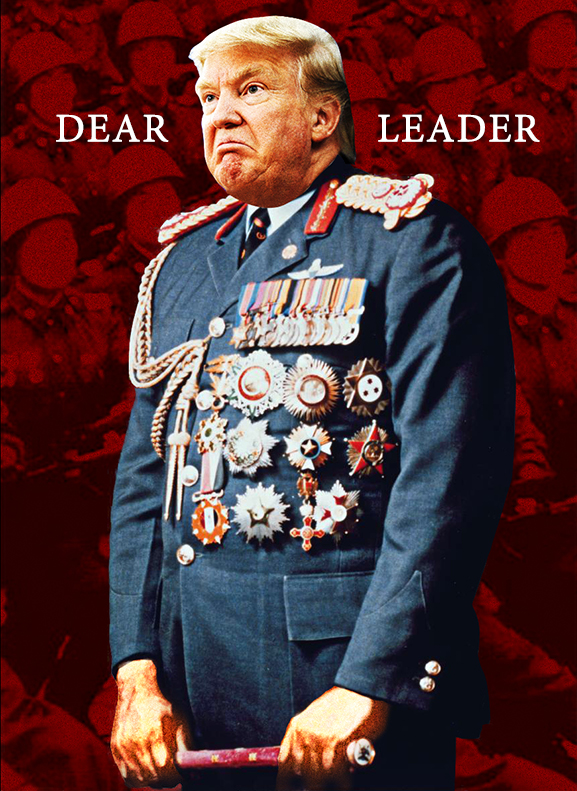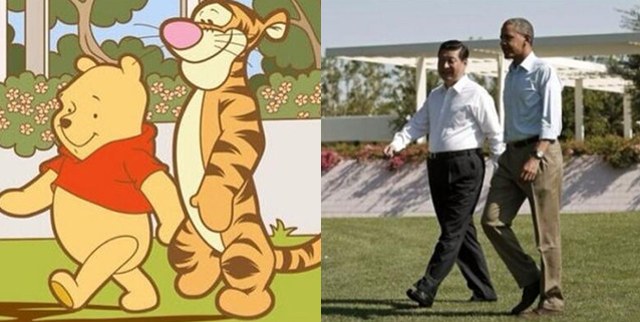Similar and different – an occasional reflection
As huge economies with large and diverse populations, occupying about the same land area at about the same range of latitudes, China and the US have many similarities. Similarities extend to many elements of culture and institutions, good and bad. The similarities are often surprising; the differences confuse us, but may be a source of new perspectives.
Domestic and foreign affairs in 2018 – Xi, CCP, DJT, GOP – A brief review - Part 1 of 5 - Government and Party
In 2018, we have the Chinese government, run by an authoritarian party with a grandiose leader, and the US, currently run – we cannot say, governed - by a would-be authoritarian dictator. Both leaders want to individually dominate state, party, people, and economy. That is what authoritarian leaders do. Mr. Xi and Mr. Trump are mirror images, of a kind. Both are incensed by unflattering portraits -

Source: Down with Tyranny and see Trump asks media to not publish unflattering pictures
Winnie-the-Pooh is now censored in China, and a Shanghai artist who put an altered Xi picture on t-shirts, suitcases, and coke cans was arrested, facing five years in prison.

Source: Shanghaiist
Of course, the world is more complicated than can be represented by images. But for fun, let’s take a quick look at some similarities in the leaders – a bit of, “how is this thing not like the other thing?” Let’s look at intra-government and intra-party relations, stability, tariffs and tribute, trust, the international system of relations among states, economic development, and public morality. This is part 1.
Government and party - China
The era of Xi Jinping has been one of increasing nationalism, xenophobia, and fear and terror among government employees, university faculty, and fear among the population. Fear is a tactic. The blacklist already exists and students are recruited to report on teachers and Xinjiang muslims live in fear of being put into camps.
In 2015, I attended a dinner in Hangzhou with about 15 Chinese government officials, all former students of mine in Chicago. Xi Jinping had been Party leader in Zhejiang for five years, until 2007, and one might expect some optimistic views of their former leader. To a man, they – uncharacteristically - expressed fear at the developments under Xi. Since then, every government official or university professor I have talked with likens the current environment to that of the Cultural Revolution, when there could be no trust among family members, friends, and colleagues. My friends in China report watching what they say now, even privately among friends, for fear of someone snitching. A friend reports another colleague being detained after a private conversation at a dinner, clearly having been reported by another at the meal.
Colleagues report that university teachers have lost their jobs over a comment in class that was perceived as too western-positive, and the comment reported to the jiwei discipline inspection bureau. The government watches and sometimes harasses Chinese students in America, Chinese businessmen everywhere, and foreign academics who write about China. Last year, a business friend from Guangzhou gave a talk at a university in Taiwan, mentioning something that CCP did not appreciate. When he returned to the mainland, the police were waiting for him. He was detained, later allowed to go home, but the threat from the long arm of oppression is usually enough to deter free speech and free thinking.
Mr. Xi is the supreme leader, and deference must be paid, even by the extremely wealthy and successful.
Wang Jianlin, head of Dalian Wanda group, one of the largest real estate developers in China, gave a talk at Harvard Business School in 2015. During the talk, he waxed eloquent on his achievements, along the “I built that” line on the way to becoming China’s richest man. This was too much show of hubris, even speaking in a foreign country. But more damaging than a bit of hubris were his answers to questions. Possibly most damaging was Wang's answer to a question about an investment in a Wanda subsidiary from Xi Jinping’s brother in law. The brother in law sold stock in the subsidiary just before it was bought by another company, and the brother in law would have made a lot of money. Most likely, Xi put a lot of pressure on the brother in law to sell early. But the problem for Wang was in admitting that a Xi family member had been an investor at all. It’s not nice to know anything about the dealing of senior CCP family members.
The talk was available on YouTube. Now, Dalian Wanda bank loans have been called in, Wang has been forced to sell properties at huge losses to market value. With the long reach of the xuanchuanbu, the Propaganda Office, and the jiwei, the discipline inspection bureau, someone saw the video. Along the same lines as, “its not nice to fool Mother Nature,” its not nice to fail to honor CCP.
For many years, it was common for individual Chinese to talk openly in a private setting with individual trusted foreigners. Views could be shared that could not be shared in a group setting or in public. Those days are over. The feeling among Chinese is that every communication venue – wechat, weibo, email, certainly speech in restaurants – might be monitored. Chinese are aware of the Wang video, and they are aware of the monitoring done by Offices of Overseas Chinese Affairs of students in the US. They are aware of the kidnappings of Chinese – in some cases, Chinese with foreign passports – to return them to China for interrogation or discipline. They are aware of the threats to family members if cooperation is not forthcoming. What is coming from China now is the sound of silence. It is not love it or leave it. It is express your love or perhaps never leave it.
The CCP fear of its own people is at the foundation of censorship, repression, and disappearances of journalists, civil rights lawyers, and academics who say what they think. Isabel Hilton, a veteran China journalist - Party's fear of its own people spells trouble
As the liberal order staggers, China is building an extensive network of influence that will inhibit its recovery… Outwardly confident, an increasingly authoritarian party manifests mounting mistrust of its people, treating its own citizens as a potentially hostile force to be controlled and, if necessary, subdued.
Government and Party - US
It would not be unreasonable to read the above two sentences as applying to Trump and the Republican Party. See voter repression in Georgia and elsewhere.
The era of Trump in America has been one of increasing nationalism, xenophobia, and fear and dismay among federal employees, university faculty, and the population. Fear is a tactic - Trump and the politics of fear and cruelty is the point. The GOP is now the party of fear. Read the Isabel Hilton article cited above, and compare. Truth is a casualty is the US as well.
David Shambaugh has said of Xi what could be said of Trump, with only slight modification –
So dominant is Xi that Chinese politics have become a sycophantic echo chamber. Xi is trying to run the party like a military, with orders given and to be followed — rather than as an organization with feedback mechanisms and procedures to curtail dictatorial practices. Xi is very much a mid-20th century Leninist leader ruling a huge country in the globalized, early-21st century era. There is thus a contradiction between Xi’s modality of rule and the realities of the modern world and China’s developmental needs. East Asia Forum - China Under Xi Jinping
Each is an anomaly in his party, amassing more power and wealth than is dictated by custom or permitted by law. The family of each has accumulated fabulous wealth through (at least potentially) illegal or underhanded means Bloomberg on Xi Jinping, 2012 and New York Times on Trump tax schemes. Bloomberg and the New York Times, which ran a story later in 2012 on the wealth of the Wen Jiabao family, remain blocked in China. The problems of our current dear leader with the news media and the concept of truth are well known. If he could find a way to block media access, one should not doubt that he would do it.
This is not the place to document how well the Republican Party in America is honing to the well-established policies of CCP toward governance, openness, and integrity. The parallels are certainly frightening. The reader will be interested in The Corruption of the Republican Party by George Packer in the Atlantic.
The corruption I mean has less to do with individual perfidy than institutional depravity. It isn’t an occasional failure to uphold norms, but a consistent repudiation of them. It isn’t about dirty money so much as the pursuit and abuse of power — power as an end in itself, justifying almost any means. Political corruption usually trails financial scandals in its wake — the foam is scummy with self-dealing — but it’s far more dangerous than graft.
Packer makes a surprising connection, referring to the beginnings of this modern, authoritarian Republican Party -
Several of its intellectual founders — Whittaker Chambers and James Burnham, among others — were shaped early on by Communist ideology and practice, and their Manichean thinking, their conviction that the salvation of Western civilization depended on the devoted work of a small group of illuminati, marked the movement at its birth.
The reader will be interested in State of Emergency in the Atlantic Magazine, a reflection on what Trump could do, more or less legally, with declaration of a state of emergency; or the betrayal of democratic values by Republicans in Michigan, in Wisconsin, in North Carolina at an NYT op-ed on power grabs and Andrew Sullivan on loss of legitimacy and democracy is dying by natural causes.
I am reminded of Edmund Burke – “The only thing necessary for the triumph of evil is for good men to do nothing.”
One of my favorite quotes is that of an internationally renowned Swedish statesman from the 17th century. His name is sufficient to endear him, since it runs trippingly off the tongue, in an Americanized version if not in the Swedish. The quote is from a letter to his son, who was attending his first major European diplomatic event and was worried about his lack of experience. Axel Oxenstierna – "Do you not know, my son, with how little wisdom the world is governed?"
From the wiki –
Oxenstierna is regarded as a brilliant pragmatist, willing to reconsider his positions. There are examples of discussions within the Privy Council when Oxenstierna rejected laws he himself had earlier introduced, admitting that he knew better now. His way of examining, reconsidering, testing, and sometimes rejecting his earlier opinions constitutes his legacy more than his ideas on particular points of policy.
In completely delusional moments, I wonder … what if someone were to bring this quote to the attention of Xi and Trump, for thoughtful reflection … ?
coming: Part 2, Stability
